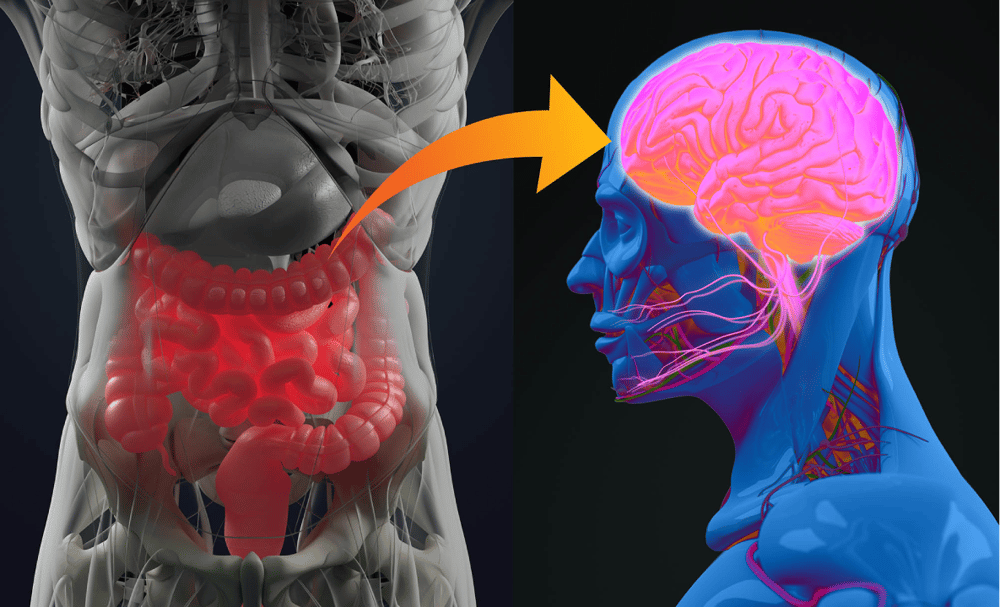The gut-brain axis is a powerful communication network linking your gut and brain, influencing emotions, mood, and mental health. Through pathways like the vagus nerve and the gut microbiome—which produces neurotransmitters like serotonin—the gut plays a major role in shaping how we feel.

Now that we live in a fast-moving world, we prefer to mention listening to our "gut feelings" in making decisions. But what if your gut does not only tell you to go to the right decision? Researchers now introduce amazing evidence that the gut is not only a stomach—it's a mighty emotional control center.
This is the introduction to the realm of the gut-brain axis, where stomach and brain secretly, continuously exchange messages. In this article, we’ll dive deep into how the gut shapes your emotions, the science behind the gut-brain axis, and practical ways to nurture this incredible connection for better mental and physical health.
What Is the Gut-Brain Axis?
The gut-brain axis is the intricate, two-way communication system between the brain's intellectual and emotional centers and the processes of the intestines. It is powered by the synergy of neural, hormonal, and immune mechanisms.
A major player here is the vagus nerve, the longest cranial nerve in the body. It serves as a "highway" of signal transmission between the brain and intestines, determining the way we think, feel, and even act.
As a bonus surprise, your stomach also contains another nervous system known as the enteric nervous system (ENS), otherwise described as the "second brain." It has an amazing 100 million plus nerve cells, more than that of the spinal cord! The ENS will function on its own but typically speak with the brain, controlling mood and emotions in the present.
Meet Your Microbiome: The Tiny Influencers
Another important player in the gut-brain conversation is your gut microbiome—the trillions of viruses, fungi, and bacteria that reside in your intestines.
These small guys manufacture neurotransmitters such as serotonin, dopamine, and gamma-aminobutyric acid (GABA), which are vital for mood regulation, anxiety, and happiness. In fact, approximately 90% of the body's serotonin is made in the gut, not the brain!
When your gut microbiome is healthy and balanced, you’re more likely to feel emotionally stable. But if it's disrupted—a condition known as dysbiosis—you might experience symptoms like anxiety, depression, irritability, and even brain fog.
How Your Gut Shapes Your Emotions: The Science
Here’s a closer look at how the gut influences your emotional well-being:
1. Neurotransmitter Production
The gut microbiota secretes neurotransmitters that directly influence your mood. Reduced gut bacterial diversity may decrease serotonin levels, leading to depression.
2. Inflammation and Mood
An unhealthy gut generally results in inflammation, which has a connection with mood disorders. Chronic inflammation may make the brain less efficient at managing emotions and raise the risk of developing mood disorders such as anxiety and depression.
3. Stress Response
The gut-brain axis helps to regulate how the body reacts to stress. Imbalance in the gut will magnify reactions to stress so that things that under normal circumstances would not be a challenge become unachievable.
4. Cognitive Function and Memory
The most recent research indicates that gut health also has an effect on cognitive processes such as memory, focus, and decision-making, again connecting the digestive system to mental and emotional performance.
Practical Strategies to Enhance Your Gut-Brain Connection
Improving gut health can lead to tremendous improvements in emotional resilience and mental clarity. Here are some gut-soothing strategies:
Consume a Balanced, High-Fiber Diet
Eat all types of fruits, vegetables, legumes, and whole grains. These nourish the bacteria in your gut to create a rich and diverse microbiome.
Add Fermented Foods
Yogurt, kefir, sauerkraut, kimchi, and kombucha add healthy probiotics to your gut.
Avoid Processed Foods and Sugar
Processed food and added sugar can throw off your gut microbiota and cause inflammation.
Stay Hydrated
Hydration maintains the mucosal layer of the intestines and healthy bacteria intact.
Stress Less
Mindfulness, meditation, yoga, and diaphragmatic breathing can reduce stress and enhance communication between the gut and brain.
Sleep Tight
Sleep maintains gut health, and lack of sleep can quickly change your microbiome balance, which impacts your mood.
Consider Probiotics and Prebiotics
Supplements can restore balance, but always best to check with a healthcare professional first.
The Bottom Line
Your gut is more than an engine for digestion—it's a key partner when it comes to emotional balance and mental health. Taking care of your gut isn't just increasing physical health; it's also building emotional resilience, mood, and mental acuity.
The next time you get a "gut feeling," pay attention. Your stomach might be smarter than you when it comes to feelings!